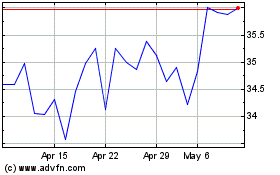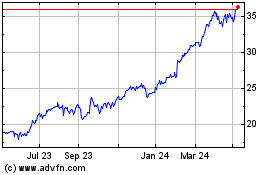Italian Banks Win From Sovereign Debt's Startling Rally
July 05 2019 - 7:59AM
Dow Jones News
By Avantika Chilkoti
A large rally in Italian bonds is making winners out of the
country's banks, whose shaky finances have weighed on global
markets in recent years.
Shares of the two largest Italian lenders, UniCredit SpA and
Intesa Sanpaolo SpA, have surged almost 7% since the end of last
week. Local banks, which have loaded up on the sovereign debt in
recent quarters, hold more government bonds than their counterparts
in other major European economies. That resulted in the lenders
carrying 20.1% of outstanding Italian government debt securities in
March, up from 17.5% a year earlier, according to data from Italy's
central bank.
Investors piled into Italy's bonds this week, after the
government pledged Monday to hit a lower budget deficit in 2019
than expected, helping end a standoff between Rome and European
Union authorities. Markets also grew more optimistic about fresh
monetary stimulus for the broader region following Christine
Lagarde's nomination to lead the European Central Bank.
On Wednesday, the fresh optimism over Italy's public finances
precipitated the sharpest single-day drop in Italian 10-year
government-bond yields since the peak of the sovereign-debt crisis
in August 2011. The yield on these bonds fell Thursday to as low as
1.569% -- a level not seen in more than 2 1/2 years -- after ending
the previous week at over 2%, according to Tradeweb data.
The rally in bond prices, which move inversely to yields, has
benefited not just the banks, but also fund managers on the hunt
for returns amid unprecedentedly low interest rates globally.
"A good part of European assets are in negative territory, which
sort of shrinks the universe of positively yielding securities,"
said Eric Brard, head of fixed income at Amundi, Europe's largest
asset manager.
Mr. Brard bought more Italian government debt this year as
yields looked increasingly attractive. "You have quite liquid
conditions and money looking for places to be put to work."
The gains this week mean Italy's government bonds have recovered
all the value lost since early May 2018. The debt was shunned by
investors after two populist parties came together to form the
government in 2018, with pledges to spend more on welfare while
cutting taxes. That put Italy in danger of breaching European Union
fiscal limits, triggering speculation about the nation's place in
the eurozone and sending shock waves through global markets.
On Wednesday, the European Commission decided that disciplinary
action was no longer warranted, following the government's promise
to cut the forecast deficit.
"That was really positive for the Italian banks," said Tom
Kinmonth, a senior fixed-income strategist at Amsterdam's ABN Amro,
who noted that Italian bank stocks have rallied for the past four
weeks.
The banking sector's sizable government bondholdings -- which
have bolstered the value of their assets this week -- are more
frequently a cause for concern among investors. During the last
debt crisis, the shrinking value of government debt led to
impairment in some banks' balance sheets and curbed lenders'
appetite for extending credit to businesses, resulting in a "doom
loop" that constrained economic growth.
The easing of tensions helped pare the prices of credit-default
swaps, a form of insurance on debt, for Italian sovereign bonds.
The annual cost of insuring $10 million of Italian government debt
for five years fell to $167,000 from around $200,000 at the end of
last week.
Pat Minczeski and Lauren Almeida contributed to this
article.
Write to Avantika Chilkoti at Avantika.Chilkoti@wsj.com
(END) Dow Jones Newswires
July 05, 2019 07:44 ET (11:44 GMT)
Copyright (c) 2019 Dow Jones & Company, Inc.
Unicredit (BIT:UCG)
Historical Stock Chart
From Mar 2024 to Apr 2024

Unicredit (BIT:UCG)
Historical Stock Chart
From Apr 2023 to Apr 2024
